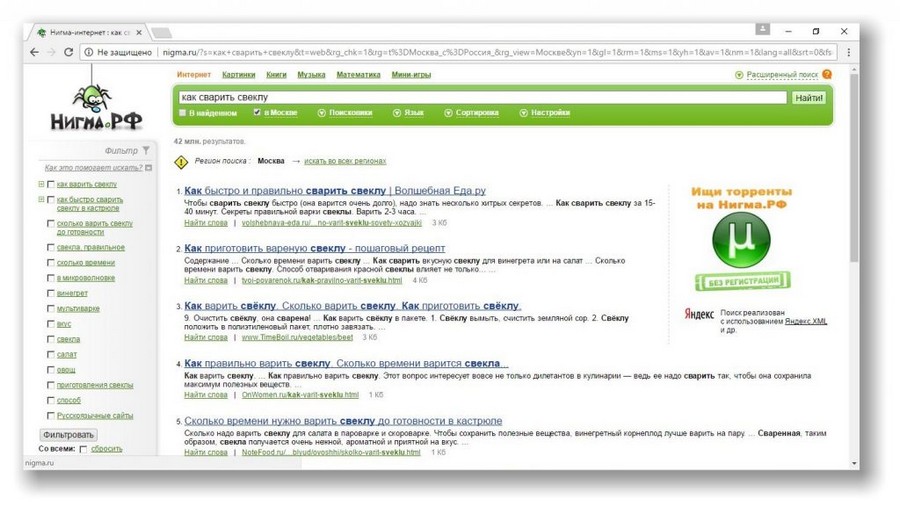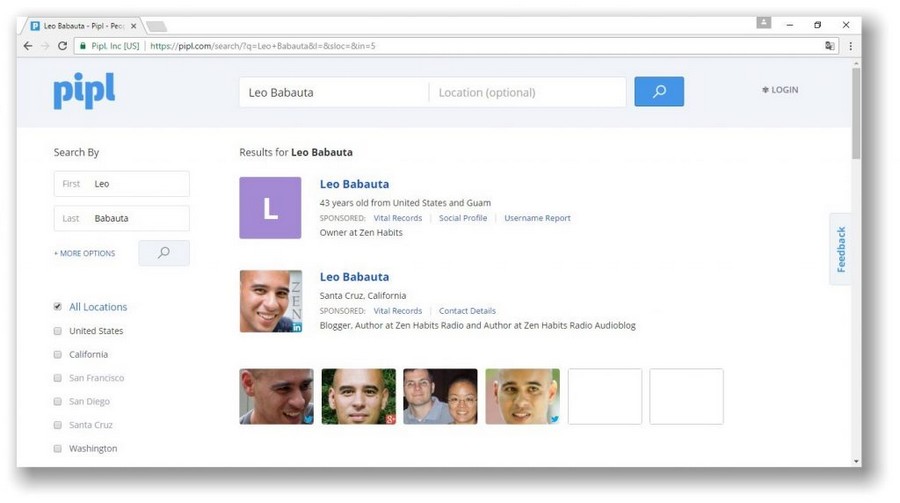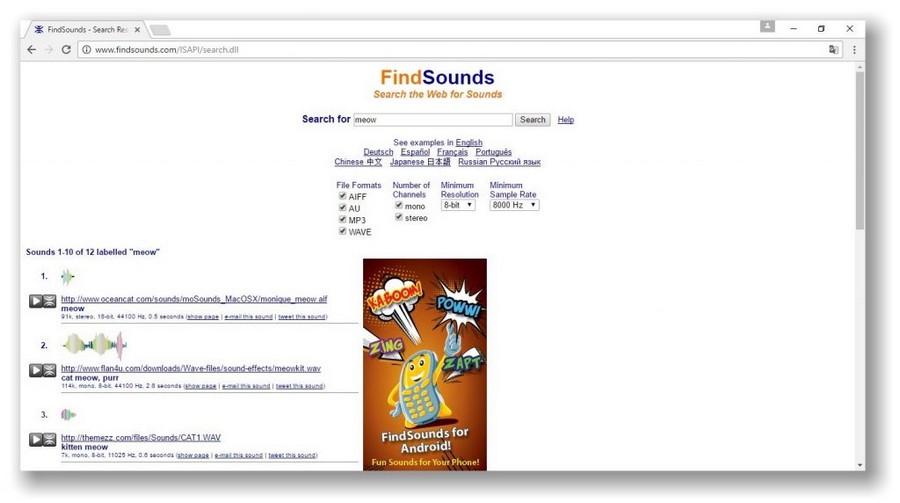Today we will talk about the best anonymous search engines for the regular Internet, the so-called Clearnet, which everyone uses.
I will tell you about all existing search engines that offer the user more anonymity and privacy than the popular and well-known search engines.
At the beginning we will focus on key points choosing an anonymous search engine. You will learn what a user should pay attention to if he does not want to leave traces on the network. Then there will be an overview of each individual search engine.
We will also analyze situations in which it is better to use an anonymous search engine, and when it is preferable to use the familiar Yandex, Google and Bing.
Anonymous search engine
- Foreword
- Search engine security
- Search engine anonymity
- Anonymous search engines
- DuckDuckGo
- Ixquick
- Startpage
- eTools.ch
- Privatelee
- Other anonymous search engines
- Conclusion
Search engine security
Safe Internet search begins with encrypted transmission of a request between the user and the server. I used the excellent SSL Server Test to test the encryption. I drove all the search engines through it and identified the obvious outsiders of our review.
Why outsiders?
Because a search engine that claims to be anonymous and secure should first of all forcefully automatically establish a secure SSL connection.
To do this, in the address bar of the eTools search engine, you need to manually enter "https". In YaCy search - enable the use of the secure HTTPS protocol in the settings. And other than DuckDuckGo, Startpage Ixquick is even worse with this case.
Google and Yandex have no such problems. In general, in terms of security and encryption of requests, there is no equal to Yandex and Google.
Another important criterion is the length of the encryption key. The longer the better. DuckDuckGo performed at its best with 4096 bit RSA encryption. Its competitors use keys that are half the size. But even they will be considered safe for a long time.
You should also pay attention to PFS. This parameter is even more important than the encryption key length. For those who are not in the know, PFS (Perfect forward secrecy) translates as perfect forward secrecy. In simple words PFS is a write protection of an encrypted session by intelligence agencies and hackers.
Search engine anonymity
It's all about security. And now about anonymity. Unlike Google, Yandex and others, where all your requests are stored, processed and analyzed, anonymous search engines do not store your Internet activity.
By the way, you can see all your Google queries using the "" service. There you can also find your other tracks left on the net. It is saved in the same way.
Well, and finally, about the cookies, i.e. Cookies. Persistent cookies in anonymous search engines are stored only if changed standard settings - for example, if installing the DuckDuckGo interface language or the Ixquick interface theme. None of the alternative anonymous search engines use a user ID in cookies.
And Google does this with every request. It dynamically uses multiple persistent ID cookies to process the IP address to accurately identify the user. What did you think?
Anonymous search engine Yacy
Ixquick anonymous search engine
That's all, friends! Reliable anonymous search system - a tool that should be at hand for every advanced web user.
Special thanks to the regular reader of our site and my good friend D1m0n. And of course thanks for your likes!
In the article "Searching in Tor" we have already talked about the best search engines for the hidden internet. Today we will talk about the best anonymous search engines for the regular Internet, the so-called Clearnet, which everyone uses. I will tell you about all existing search engines that offer the user more anonymity and privacy than the popular and well-known search engines. In the beginning, we will talk about the key points of choosing an anonymous search engine. You will learn what a user should pay attention to if he does not want to leave traces on the network. Then there will be an overview of each individual search engine. We will also analyze situations in which it is better to use an anonymous search engine, and when it is preferable to use the usual ...
User rating: 4.5 (35 ratings)Journalist, columnist, public relations specialist.
Graduated from the Biological Faculty of BSU. He began his career as a journalist in 1995 in Delo magazine. He collaborated with Belorusskaya Delovaya Gazeta until its closure, the newspaper Moskovsky Komsomolets in Belarus, Business Lady, Financial Director, Detective Gazette, the BEL.BIZ portal, and the Interfax news agency.
He was a correspondent in Belarus for the Russian news agency Stringer. He served as deputy director of the Stalitsa radio station.
Worked as a PR-manager at the International Finance Corporation (IFC).
Since spring 2010 - own correspondent in Belarus for the Russian federal publication Gazeta.Ru.
Since January 2013 - again works in BDG (now under the brand “BDG Delovaya Gazeta”).
Are you here
How to find things that Google won't even search
For two decades now, working in the media, I have seen the same phenomenon. Namely: some journalists are completely not in the mood to master new technologies, and it seems that they are still nostalgic for typewriters.
Others, on the contrary, master new technologies at a cosmic speed, ahead of the most notorious technologists. This text is for the second category.
We are all accustomed to using the world's most popular search engine, Google, to find the information we need. Billions of searches are recorded every day on Google sites, available in about 200 languages, and it is no coincidence that the main site Google.com is considered the most popular Internet resource. Also, Yandex and Bing are used quite often.
However, we must admit: the Google search engine is designed for the mass consumer, for those who, in 99% of cases, more than enough of the first three pages of search results. But journalists are just those people who need to find something not too widespread, to delve deeply into the issue. However, even the most advanced search engine is not able to search equally well in blogs and scientific articles, in digital images and culinary recipes... It is for this reason that there are many not too well-known search engines that specialize in some kind of "narrow" search, or know how to search where traditional search engines usually do not look. After all, universal search engines simply "do not see", for example, no longer existing web pages, or old versions of pages, content on social networks, pages that are intentionally closed to "web spiders", etc.
So what can we use?
1. Answer the question
You can search for something by keywords or phrases, or you can ask a question in natural human language. These are the questions that Answers.com - a search engine that allows you to find answers to a huge number of questions. The search result is not a collection of links, but articles from Wikipedia, Oxford University and other authoritative resources. But you have to ask in a clean english language.
2. Find something that no longer exists
Today, almost every advanced Internet user knows how to use the Google or Yandex cache when he needs to view (and / or provide as evidence) a recently deleted or changed page in its original form. Well, or see her as she was at a certain point in time. However, there is a certain problem: such a cache is available for search results only relatively a short time... This is understandable: the task search robot - give out the most current version Internet resource.
However, sometimes you need to see a site as it looked, say, a few years ago. For this, special search tools - such as, say, a web service Wayback machine ... His work is supported by the Internet Archive, a non-profit organization that has been collecting copies of web pages and multimedia content posted on the Web since 1997. All these copies, stored on multiple servers, are available free of charge to everyone. The Wayback Machine allows you to find more than just old version the existing site, but also those web pages that have not existed for a long time - we are talking about closed sites. To date, the "Archive of the Internet" has already collected more than 366 billion pages, so that you can find the required one with a very high probability.
3. Looking for a picture
Today, the vast majority of users who need to find some kind of photo or other graphic file use Google Images for this purpose. But still, the largest-search engine-in-the-world is "sharpened" for text search, and the search for pictures for him is only one of the additional services.
So if you could not find the required google help Images, it makes sense to use something specialized. For example, service Picsearch ... According to its creators, their brainchild has already indexed more than three and a half billion digital images.
Among the advantages of Picsearch - as multilingual user interfaceand a full-fledged multilingual search, as well as a number of very practical filters, for example, the ability to search only black and white or color images, pictures with a predominance of a particular color, search for "wallpaper" for the desktop, as well as faces or animated images.
A search engine can also be a worthy alternative to Google Images Everystockphoto ... On the one hand, it is much smaller in size - it contains "only" about 25 million images stored on online photo sites, including Flickr, Fotolia and Wikimedia Commons. However, experts say the results of her work are truly impressive. Most of the images found can be used for free, however, provided that the name of the photographer or copyright holder is indicated.
The search service for the content of images stands apart Picollator.ru... When you enter a query in most search engines offering searches graphic files, you get results based on what text appears on the page, as well as on file names. Picollator works in a fundamentally different way, identifying what is shown in the pictures. It is clear that in this case the search query should not be formulated in the form of a word or phrase, but as a picture.
That is, for search, you should upload a photo to the server or provide a link to a site where it has already been uploaded. The search results will contain thumbnails of images similar to the uploaded photo. True, this service only works with photographs of people, and of good quality.
Unfortunately, too many journalists - especially those who come from the journalism faculty - are “not friends” with numbers. Many do not even see the difference between percentage and percentage points, which is why articles on economics sometimes turn into gibberish. One of the most famous "alternative" search engines can help them - WolframAlpha .
In fact, this is an "encyclopedic" search engine, the task of which is to provide answers to really difficult questions in such areas as mathematics, physics, medicine, statistics, history, linguistics and other fields of science. Essentially, WolframAlpha is more of a colossal database, some of which has been transformed into computational algorithms. It is thanks to them that the user of the search engine can get detailed information about how many grams of protein and calories are in a cup of cocoa, what is the expected life expectancy in the USA, France and Australia next year, or how the algebraic equation is solved.
However, to fully use WolframAlpha, you need to be fluent in English. The system, unfortunately, does not support other languages.
5. Science again
The scientific world has always been somewhat closed to the uninitiated. Of course, it is not fenced off from the general public by a steel wall, but in order to read scientific publications, delve into specific databases and watch the results of experiments, Internet users usually need to register and get special access. That is, ordinary search engines do not index this information - for them, almost all scientific articles belong to the category of the so-called "Deep Web".
So if you really need to delve into scientific information that is incomprehensible to most of the uninitiated, use a specialized search engine. Such as a search engine CompletePlanet with access to over 70,000 scientific databases and highly targeted search engines.
6. Looking for a man!
An ordinary search engine can be used only to find information about a certain celebrity. If you need information not about a public person at all, then the chances of finding any data drop dramatically. And then you need to use a specialized search engine.
The most famous of these systems is the search engine Pipl ... It searches for data about people in a variety of public registries, online databases, services and social networks... The big advantage of the Pipl service is that it works with Cyrillic, so it is quite effective with Russian-speaking surnames.
Alternative - Russian service SpravkaRU.NET ... He can find the address and home phone resident not only in Russia, but also in Ukraine, Belarus, Kazakhstan, Latvia and Moldova. In fact, this is a large electronic telephone directory of large cities in post-Soviet countries, although it is far from complete. However, unlike many similar services, SpravkaRU.NET contains quite up-to-date databases. So if you have at least some information about relatives or the approximate place of residence of the object of your interest, then this will surely help you find it. Note that the service often does not work.
The easiest way to find someone is to use a search engine Yandex.People ... It is checked: you will not get a lot of information, but you will almost certainly find the person himself.
7. Blog Search
Over the past decade and a half, blogs have become not just a social and cultural phenomenon, but also simply a bottomless source of a wide variety of information. Far from always reliable and correctly presented, but often still very interesting. Specialized search on Russian-language blogs - service Yandex Blogs ... No bells and whistles, just a working search.
8. Keep your search a secret
One of the outstanding developments of the 2010s - anonymous search engine DuckDuckGo ... This is an open search engine source codefounded in September 2008. In its user agreement, DDG emphasizes the confidentiality of data provided by users, refusal to record and store user information and from tracking users.
Technologically, DuckDuckGo differs from universal search engines in that it does not use the Filter bubble, that is, it does not take into account the user's past requests to determine what information is most interesting to him. DuckDuckGo uses HTTPS communication between the client and the server by default, using the RC4 encryption algorithm with a 128 bit key. Also DDG Search engine does not use cookies and does not store data about the IP-addresses of users, does not offer to log in and encrypts the transmitted data by default.
The anonymous search engine is the brainchild of programmer Gabriel Weinberg. He created DDG in 2008, deciding from the very beginning that it would not store user data, as it contains too much personal information. “If you ask people about the importance of their search privacy, they will answer that it is very important, but almost no one tries to make their search queries anonymous,” Weinberg wrote on his blog. - Google stores not only the search queries of users, but also the IP addresses from which they accessed. It is a myth that Google has to store all this information. Almost all the money they get is based on what the user types in the search bar. "
At first, DuckDuckGo was little known: back in early June 2013, it was processing only 1.7 million requests per day. But then there was a scandal: information about the PRISM program was made public in the United States - with its help the US NSA gained access to the servers of companies, including the owners of the world's largest search engines - Google, Microsoft and Yahoo. Shortly thereafter, the number of daily requests to DuckDuckGo exceeded 3 million per day and continued to grow rapidly.
it search base data on the most popular dll libraries... Files are sorted alphabetically, there is a search function. The file you are looking for can be found even if you only know the approximate name of the library.
13. Search for medical information
Website Medpoisk.ru - a universal search engine that is designed to search exclusively on medical sites. Uses Google search engine. This is a practical tool not only for doctors, but also for anyone who needs an answer to any question in the field of medicine. How to treat this or that disease, what are the contraindications for this or that medicine, which doctor to contact. The search engine also includes a labor exchange for medical workers.
14. Space is our everything
Astronomical search service Astronet.ru specializes in searching for information on sites related to astronomy and space exploration. In total, the search engine database contains about five hundred sites on astronomical topics - sites of observatories, amateur pages, libraries of scientific literature, and the like.
In addition to the search function, the site has tons of other useful services, among which, for example, the English-Russian-English astronomical dictionary, a biographical reference book with detailed information about all scientists who have contributed to the development of astronomy, a glossary of astronomical terms. There is also a handy sky map that generates the position of the constellations, depending on the latitude and longitude of the observation point, as well as the time of day.
Of course, this is only a small part of the alternative search services... And over time, some of them stop working, but new ones appear. The best minds create more and more advanced algorithms for selecting Internet search results. However, if you learn to skillfully operate the syntax search query, then Google, Yandex, Yahoo! and other search engines " general purpose»Can produce results no worse than alternative search engines.
For me, the most surprising thing about Yandex search engine is that a huge number of people still use it. My acquaintance with the Internet, like most at that time, began through the search engine Yandex. There were many popular search engines, including Russian ones, at that time. I searched for what I needed with the help of different search engines, and for a long time my empirical experience confirmed that if Yandex did not find something, then others will certainly not find anything useful for this request. I also liked the slogan of that Yandex that “Yandex is not a censor of the Internet, but its mirror”. It meant that Yandex does not filter search results, even if some of its results are not liked by someone.
At that time, it was common practice to go up to 7 and 11 pages of SERP, etc. either Runet was still small, or search engines worked so-so. This is now the overwhelming majority rarely for any request comes at least on the second page of search results.
Some time later, I noticed that Google caught up with Yandex in terms of the quality of search results. But I continued to use Yandex even when I realized that Google got better. It's all about the conservatism inherent in most people: I had mail on Yandex, and in general, people have some fears about changes. In general, I made up my mind and completely switched to search from Google, and after a couple of weeks my fears about the transition began to seem naive and ridiculous.
Sometimes I go back, "test" search results Yandex and only once again am convinced how right I was when I stopped using it. Runet, through the eyes of Yandex, is kind of broken, incomplete, with some kind of skewed priorities.
Some time ago, it is difficult to say exactly when, but Google has ceased to cause a feeling of complete satisfaction. Those. overwhelmingly, Google is perfect and gives out exactly what is needed at the very first positions. But when searching, for example, movies or something other counterfeit, Google censors the results. Google informs about it directly on the SERP page. This, as well as the constant "Google is tracking users" has always pushed to experiment with other search engines.
I began my post by saying that most of us are very conservative and are very reluctant to change our habits. As of today, judging by the number of visits to my sites, there are very few duckduckgo.com users. Someone simply does not know about its existence, someone tried it before and did not like it. It's time to try something new. Anyone wishing to look at the Internet (Runet) with a clean, unclouded censorship or delusional "ranking" look, I invite you to try the search engine DuckDuckGo, the main slogan of which, by the way, is "A search engine that does not track you."
The system contains many different interesting settings, you can find them on this page
At first glance it may seem that there will be better than google only Yandex can, and even that is not a fact. These companies are investing huge amounts of money in innovation and development. Does anyone have a chance not only to compete with the leaders, but also to win? Lifehacker's answer: "Yes!" There are several search engines that have succeeded. Let's take a look at our heroes.
What is it
It is a fairly well-known open source search engine. The servers are located in the USA. In addition to its own robot, the search engine uses results from other sources: Yahoo! Search BOSS, Wikipedia, Wolfram | Alpha.
The better
DuckDuckGo positions itself as a search engine that provides maximum privacy and confidentiality. The system does not collect any user data, does not store logs (no search history), use cookies as limited as possible.
DuckDuckGo does not collect or share personal information from users. This is our privacy policy.
Gabriel Weinberg, founder of DuckDuckGo
Why do you need it
All major search engines try to personalize search results based on data about the person in front of the monitor. This phenomenon is called the "filter bubble": the user sees only those results that are consistent with his preferences or that the system considers as such.
DuckDuckGo creates an objective picture that does not depend on your past behavior on the web, and eliminates thematic google Ads and Yandex based on your queries. DuckDuckGo makes it easy to search for information in foreign languages: Google and Yandex by default give preference to Russian-language sites, even if the request is entered in another language.

What is it
"" Is a Russian metasearch system developed by MSU alumni Viktor Lavrenko and Vladimir Chernyshov. It searches in the indexes of Google, Bing, Yandex and others, and also has its own search algorithm.
The better
Searching the indices of all major search engines allows you to generate relevant results. In addition, "Nigma" breaks the results into several thematic groups (clusters) and prompts the user to narrow the search field by discarding unnecessary ones or highlighting priority ones. Thanks to the modules "Mathematics" and "Chemistry", you can solve mathematical problems and query the results of chemical reactions right in the search bar.
Why do you need it
Eliminates the need to search for the same query in different search engines. The cluster system makes it easy to manipulate search results. For example, Nigma collects results from online stores in a separate cluster. If you do not intend to buy something, then simply exclude this group. By choosing the "English-language sites" cluster, you will receive results in English only. The modules "Mathematics" and "Chemistry" will help students.
Unfortunately, the project is currently not developing, as the developers have moved their activities to the Vietnamese market. Nevertheless, "Nigma" is not only not outdated, but in some things it still gives Google a head start. Let's hope that development will resume.

What is it
not Evil is a system that searches the anonymous Tor network. To use it, you need to go to this network, for example, by launching a specialized browser of the same name. not Evil is not the only search engine of its kind. There is LOOK (the default search in the Tor browser, accessible from the regular Internet) or TORCH (one of the oldest search engines in the Tor network) and others. We settled on not Evil because of the clear allusion to Google itself (just look at the start page).
The better
Searches where Google, Yandex and other search engines are closed in principle.
Why do you need it
There are many resources on the Tor network that cannot be found on the law-abiding Internet. And as the authorities tighten their control over the content of the Web, their number will grow. Tor is a kind of Network within the Network: with its own social networks, torrent trackers, media, trading platforms, blogs, libraries, and so on.
YaCy

What is it
YaCy is a decentralized search engine based on P2P networks. Each computer on which the main software module is installed scans the Internet independently, that is, it is an analogue of a search robot. The results are collected in common basewhich is used by all members of YaCy.
The better
It is difficult to say whether it is better or worse here, since YaCy is a completely different approach to organizing search. The lack of a single server and owner company makes the results completely independent of someone's preferences. The autonomy of each node excludes censorship. YaCy is capable of searching the deep web and non-indexed public networks.
Why do you need it
If you are a supporter of open source software and the free Internet, which is not influenced by government agencies and large corporations, then YaCy is your choice. It can also be used to organize searches within a corporate or other autonomous network. And while YaCy is not very useful in everyday life, it is a worthy alternative to Google in terms of the search process.
Pipl

What is it
Pipl is a system designed to search for information about a specific person.
The better
The authors of Pipl claim that their specialized algorithms search more efficiently than “regular” search engines. In particular, priority sources of information are social media profiles, comments, member lists and various bases data where information about people is published, such as a database of court decisions. Pipl's leadership in this area is confirmed by ratings from Lifehacker.com, TechCrunch and other publications.
Why do you need it
If you need to find information about a person living in the United States, then Pipl will be much more effective than Google. The databases of Russian courts are apparently inaccessible to a search engine. Therefore, he does not cope with the citizens of Russia so well.

What is it
Another specialized search engine. Searches for various sounds (house, nature, cars, people, etc.) in open sources. The service does not support queries in Russian, but there is an impressive list of Russian-language tags that you can search for.
The better
The results are only sounds and nothing more. In the search settings, you can set the desired format and sound quality. All found sounds are available for download. There is a search for sounds by pattern.
Why do you need it
If you need to quickly find the sound of a musket shot, the blows of a woodpecker-sucker or the cry of Homer Simpson, then this service is for you. And I chose this only from the available Russian-language requests. In English, the spectrum is even wider. But seriously, a specialized service assumes a specialized audience. But what if it comes in handy?
A life alternative search engines often fleeting. Lifehacker asked Sergei Petrenko, the former general director of the Ukrainian branch of Yandex, about the long-term prospects of such projects.
As for the fate of alternative search engines, it is simple: to be very niche projects with a small audience, therefore, without clear commercial prospects, or, conversely, with complete clarity of their absence.
If you look at the examples in the article, you can see that such search engines either specialize in a narrow but demanded niche, which, perhaps only so far, has not grown enough to be noticeable on Google or Yandex radars, or they are testing an original hypothesis in ranking. which is not yet applicable in regular search.
For example, if a search on Tor suddenly turns out to be in demand, that is, the results from there will be needed at least by a percentage of Google's audience, then, of course, ordinary search engines will begin to solve the problem of how to find and show them to the user. If the audience behavior shows that the results seem more relevant to a significant proportion of users in a significant number of queries, data without taking into account user-dependent factors, then Yandex or Google will begin to give such results.
“Being better” in the context of this article does not mean “being better at everything”. Yes, in many aspects our heroes are far from Google and Yandex (even Bing is far away). But on the other hand, each of these services gives the user something that the giants of the search industry cannot offer.






